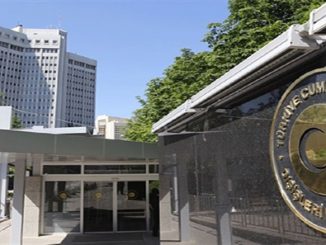
After deadly bombings hit two Coptic churches on Sunday, killing at least 45 people, Abdel Fattah al-Sisi declared a three-month state of emergency. However, the new emergency measures are said to grant broad powers to security forces as human rights situation continues to deteriorate in the country.
Emergency Laws in Egypt’s Constitution
In fact, since the adoption of the 2014 constitution, this is the first time that a state of emergency is declared in the country.
The constitution imposes limits on the president’s powers to declare an indefinite state of emergency.
Article 154 stipulates that the president must consult the cabinet before issuing an official declaration, after which the decision must be submitted to the Parliament.
Then, a parliamentary majority must approve the declaration within seven days of its issuance for the three-month state of emergency to go into effect.
After this period, it can only be extended for an additional three months by a two-thirds majority vote.
In case the parliament is not in session, the matter is taken to the cabinet for approval, to be presented to the House of Representatives in its first session.
Exceptional Powers Granted to the President under the Emergency Law
In fact, the emergency law still grants the president exceptional powers, despite this limitation.
The president, and those acting on his behalf, has the power to refer civilians to State Security Emergency Courts for the duration of the three-month period,according to the emergency law.
Moreover, there is no appeal process for State Security Emergency Court verdicts.
In addition, it extends the powers of the president to monitoring and intercepting all forms of communication and correspondence, imposing censorship prior to publication and confiscating extant publications, impose a curfew for or order the closure of commercial establishments, sequestration of private properties, as well as designating areas for evacuation.
In the same context,the emergency law grants the Armed Forces the authority to address any violations of these powers, according to Article 4 of the emergency law.
The Emergency Measures Expand the Power of the Security Forces
There is no doubt that the emergency measures will allow the security forces to take extreme measures against civilians as it will allow them to detain people for any period of time, for virtually any reason.
They also grant broad powers to restrict public gatherings and media freedom.
Accordingly, the human rights situation in Egypt will probably deteriorate more than the current situation that has already been the worst in decades.
Since al-Sisi took power in a military coup against Egypt’s first democratically elected President Mohamed Morsi,the Egyptian government has launched a massive crackdown against political opposition, lawyers,journalists and human rights group.
Human rights organisations stated that around 60,000 were imprisoned between 2013 and 2017. To accommodate them, the Egyptian authorities decided to build 10 additional prisons.
According to Egypt’s National Council for Human Rights, the facilities that already house these prisoners are extremely overcrowded.
A Human Rights Watch report on the Scorpion Prison found that the inmates were mostly political prisoners. The prisoners “suffered abuses at the hands of Interior Ministry officers, including beatings, force feedings, deprivation of contact with relatives and lawyers, and interference in medical care.”
Moreover, according to Al Nadeem Center, a local human rights group, there were 326 cases of extrajudicial killings in 2015, a number which rose to 754 cases in the first half of 2016 alone.
In August 2016, the Egyptian Coordination of Rights and Freedoms released a report on prison conditions in Egypt under al-Sisi, documenting 1,344 incidents of torture – including direct torture and intentional medical neglect – in detention facilities and prisons between 2015 and 2016.
There are also reports of enforced disappearances. In this context, Amnesty International recorded three to four disappearances a day between 2015 and 2016. The rights group states that the number could be much higher since a lot of families fear the repercussions from reporting a disappearance case.
Furthermore, Sisi issued a decree in 2014 that allowed the military wider jurisdiction, where civilians were prosecuted by the military courts. These trials contained almost no evidence and were based on investigations led by National Security officers.
Human Rights Watch said that this “formed the basis of 7,400 or more military trials of civilians” since Sisi issued the decree.
Amnesty: Egyptian authority must address sectarian violence, not abuse emergency powers
In a press release, Amnesty international said that the Egyptian authorities must address sectarian violence, not abuse emergency powers to further curtail rights.
It stated that the emergency measures included in a declaration of a state of emergency by Abdel Fatah al-Sisi in the aftermath of three deplorable church bombings in Egypt “will do little to resolve the root causes of sectarian attacks against Copts in Egypt and are likely to lead to a further deterioration in human rights.”
Najia Bounaim, North Africa Campaigns Director at Amnesty International said,”The deadly church attacks demonstrate an appalling disregard for human life and must be utterly condemned. Nothing can justify a horrifying attack on ordinary citizens attending a place of worship.”
She added,”It is the duty of the Egyptian authorities to protect the lives and safety of its population, but the solution is not to continue and intensify curtailing what little freedoms remain in Egypt. Addressing sectarian violence requires genuine political will to end impunity and provide protection.”
Bounaim said,”Egypt has a decades-long history of relying on emergency measures which grant security forces sweeping powers to commit human rights violations unchecked, leading to arbitrary detention, torture and other serious violations.”
Amnesty also said that the most worryingly that,”the Emergency Law allows the authorities to try individuals before the flagrantly unfair Emergency State Security Courts which do not allow for the right to an appeal.”
“States of emergency can never be allowed to excuse violations of non-derogable rights. Torture, unlawful killings, enforced disappearances, and arbitrary detention cannot be made lawful by declaring an emergency,” said Najia Bounaim.



